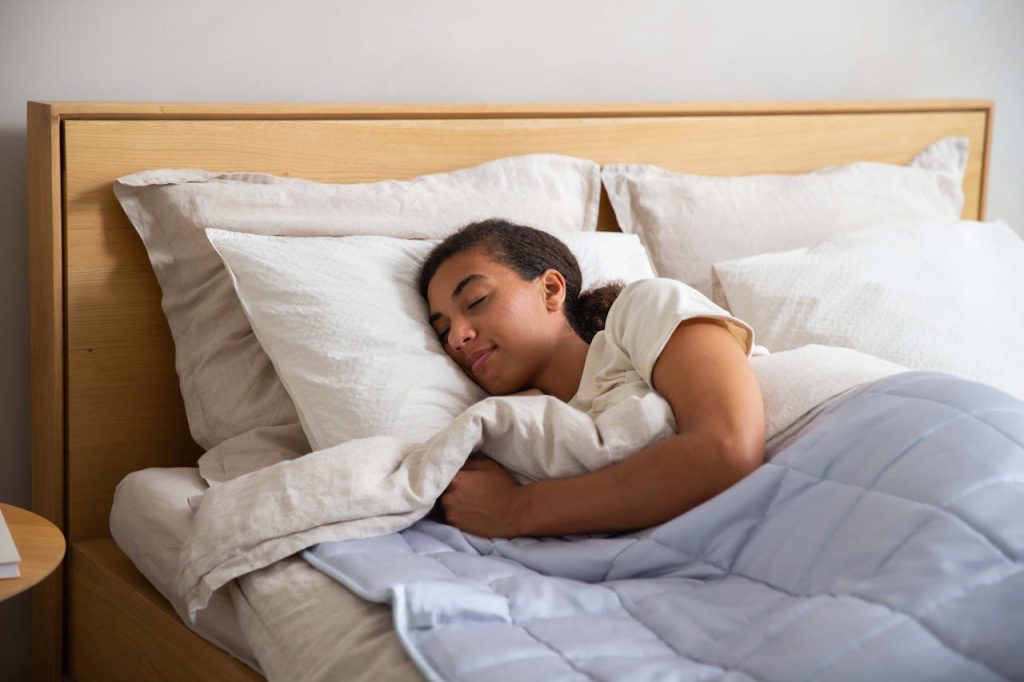Improving your sleep quality is essential for overall health and well-being, and sleep hygiene refers to the practices and habits that are conducive to sleeping well on a regular basis. Poor sleep hygiene can lead to insomnia, fatigue, and a range of health issues, so it’s important to establish good sleep habits. Here’s how you can improve your sleep quality through better sleep hygiene:
1. Create a Consistent Sleep Schedule
- Go to Bed and Wake Up at the Same Time Every Day: Consistency helps regulate your body’s internal clock (circadian rhythm), making it easier to fall asleep and wake up naturally. Aim to keep the same schedule even on weekends.
- Gradually Adjust Your Schedule: If you need to change your sleep schedule, do so gradually by shifting your bedtime and wake time by 15-30 minutes each day until you reach the desired times.
2. Establish a Relaxing Bedtime Routine
- Wind Down Before Bed: Engage in relaxing activities like reading, taking a warm bath, or practicing gentle yoga or meditation. This signals to your body that it’s time to unwind and prepare for sleep.
- Avoid Stimulating Activities: Avoid intense exercise, heavy meals, and emotionally upsetting conversations or activities close to bedtime, as these can make it harder to relax and fall asleep.
3. Optimize Your Sleep Environment
- Make Your Bedroom Comfortable: Your bedroom should be conducive to sleep. Ensure your mattress and pillows are comfortable, and consider investing in blackout curtains or a white noise machine if light or noise is an issue.
- Control the Temperature: A cooler room temperature, around 60-67°F (15-19°C), is typically ideal for sleeping. Use blankets to adjust warmth to your preference.
- Minimize Light Exposure: Keep your bedroom as dark as possible. Consider using an eye mask or blackout curtains to block out light, and avoid using bright lights in the hour leading up to bedtime.
4. Limit Exposure to Screens Before Bed
- Reduce Blue Light Exposure: The blue light emitted by phones, tablets, computers, and TVs can interfere with the production of melatonin, the hormone that regulates sleep. Try to avoid screens at least an hour before bed, or use blue light filters if necessary.
- Create a Tech-Free Zone: Consider keeping electronic devices out of the bedroom, or at least away from the bed, to reduce distractions and the temptation to check them during the night.
5. Be Mindful of What You Eat and Drink
- Avoid Heavy Meals Before Bed: Eating large, heavy meals close to bedtime can cause discomfort and indigestion, making it harder to fall asleep. Aim to have dinner at least 2-3 hours before bed.
- Limit Caffeine and Nicotine: Both caffeine and nicotine are stimulants that can interfere with sleep. Avoid consuming them in the afternoon and evening to help improve sleep quality.
- Limit Alcohol: While alcohol may help you fall asleep initially, it can disrupt your sleep cycle and reduce the quality of your sleep. It’s best to limit alcohol consumption, especially close to bedtime.
6. Get Regular Physical Activity
- Exercise Regularly: Regular physical activity can help you fall asleep faster and enjoy deeper sleep. Aim to exercise for at least 30 minutes most days of the week. However, avoid vigorous exercise too close to bedtime, as it may be stimulating.
- Time Your Workouts: Morning or early afternoon workouts are ideal for improving sleep quality, as they help regulate your body’s natural sleep-wake cycle.
7. Manage Stress and Anxiety
- Practice Relaxation Techniques: Incorporate relaxation exercises such as deep breathing, progressive muscle relaxation, or mindfulness meditation into your daily routine. These practices can help calm your mind and prepare your body for sleep.
- Write Down Worries: If your mind is racing with thoughts or worries, try writing them down before bed. This can help clear your mind and reduce anxiety about unresolved issues.
8. Limit Naps During the Day
- Shorten or Skip Naps: If you must nap, keep it short (20-30 minutes) and avoid napping late in the afternoon or evening, as this can interfere with your ability to fall asleep at night.
9. Get Exposure to Natural Light
- Spend Time Outdoors: Exposure to natural light during the day, especially in the morning, helps regulate your circadian rhythm and improves sleep quality. Try to spend time outside each day or open your blinds to let in natural light.
- Use Light Therapy: If you have trouble getting natural sunlight, especially in winter, consider using a light therapy box in the morning to help regulate your sleep-wake cycle.
10. Seek Professional Help if Needed
- Consult a Sleep Specialist: If you’ve tried improving your sleep hygiene but still struggle with sleep issues, it may be time to seek help from a healthcare professional or sleep specialist. Conditions like insomnia, sleep apnea, and restless leg syndrome may require medical intervention.



5
4.5